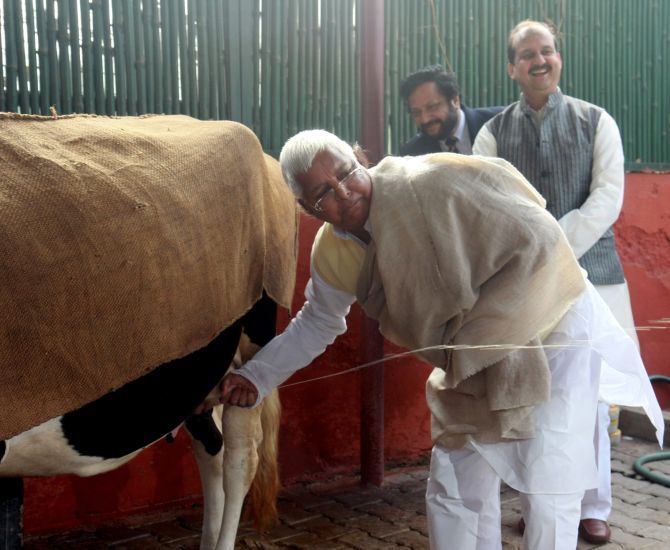In a major setback to Rashtriya Janata Dal supremo Lalu Yadav, the Supreme Court on Monday held that he has to face separate trial in each of the cases in which he is an accused in the multi-crore fodder scam and if found guilty, he may be punished separately.

Of the 64 cases arising from the scam, Yadav has been named as accused in six cases and he has already been convicted in one of the case involving fraudulant withdrawal of Rs 37.70 crore from Chaibasa treasury, which now falls in Jharkhand between period April 1, 1994 to January 31, 1995.
The other cases which are to be completed against him are relate to the treasuries of Chaibasa, Doranda in Ranchi involving Rs 139.39 crore, Dumka (Rs 3.31 crore) and Patna.
The apex court set aside the order of Jharkhand high court discharging Yadav in the case pertaining to Deoghar treasury, where an amount to the tune of Rs 85 lakh was misappropriated with the help of 250 vouchers and 17 fake allotment letters between period 1991 to 1994 and directed the trial court to conclude the proceedings in nine months from now.
Besides the RJD supremo, there are 37 other accused persons in the case.
The apex court also quashed the high court order against former Bihar Chief Minister Jagannath Mishra and ex-chief secretary of Jharkhand Sajal Chakraborty against whom the proceedings were stayed on the same ground.
While brushing aside their contentions that they cannot be tried separately for each of the cases having similar facts and circumstances, the bench said, "The modus operandi being the same would not make it a single offence when the offences are separate".
"Commission of offence pursuant to a conspiracy has to be punished. If conspiracy is furthered into several distinct offences, there have to be separate trials," a bench of Justices Arun Mishra and Amitava Roy said.
The Jharkhand high court had quashed one case against Lalu Prasad, four cases against Mishra and two cases against Chakraborty on the ground that they have been convicted in one of the cases for offences involving the same ingredients with respect to Chaibasa treasury for large scale defalcation of public funds.
The bench said that there may be a situation wherein furtherance of general conspiracy, offences take place in various parts of India and therefore each trial has to be separately held and the accused punished separately for the offence committed in furtherance of the conspiracy.
"In case there is only one trial for such conspiracy for separate offences, it would enable the accused person to go scotfree and commit number of offences which is not the intendment of law.
"The concept is of 'same offence' under Article 20(2) and section 300 CrPC. In case distinct offences are being committed, there has to be independent trial for each of such offence based on such conspiracy, and in the case of misappropriation as statutorily mandated, there should not be joinder of charges in one trial for more than one year except as provided in section 219," said Justice Mishra, who penned down the judgement for the bench.
The bench said "one general conspiracy (fodder scam) from 1988 to 1996 has led to various offences ... there have to be different trials for each of such offence based upon conspiracy in which different persons have participated at different times at different places for completion of the offence."
It directed the Central Bureau of Investigation to investigate the cases by the apex court in the wake of large scale defalcation of public funds, fraudulent transactions and fabrication of accounts in Animal Husbandry Department of Bihar, which was popularly known as fodder scam.
The apex court had directed the CBI to investigate corruption in public administration, misconduct by the bureaucracy, fabrication of official records, misappropriation of public funds by an independent agency and inform the Chief Justice of Patna high court.
The CBI had registered a total of 64 cases in the fodder scam including 52 cases which involved withdrawal of huge sums of money from government treasuries falling within Jharkhand.
The apex court said there may be a conspiracy in general and a separate one and there may be a larger conspiracy and smaller conspiracy, which may develop in successive stages involving different accused persons.
"In the instant case, defalcations have been made in various years by combination of different accused persons. Thus, there can be separate trials on the basis of law laid down by this Court," it said.
The bench said under the doctrine of double jeopardy, Article 20(2) of the Constitution says that no person shall be prosecuted and punished for the same offence more than once.
"The objective of the Article is to avoid harassment, which may be caused by successive criminal proceedings where the person has committed only one crime. This means that no man shall be put twice in peril for the same offence," the bench said, adding that the Constitution bars double punishment for the same offence.
It, however, said "the conviction for such offence does not bar subsequent trial and conviction for another offence and it does not matter even if some ingredients of these two offences are common."
Rejecting the submission of Yadav, the apex court said "though there was one general charge of conspiracy, which was allied in nature, the charge was qualified with the substantive charge of defalcation of a particular sum from a particular treasury in particular time period".
It said that since the sanctions made in the budget were separate for each and every year, the charge has to be taken in substance for the purpose of defalcation from a particular treasury in a particular financial year.
"Whatever could be combined has already been done. Each defalcation would constitute an independent offence. Thus, by no stretch, it can be held to be in violation of Article 20(2) of the Constitution or Section 300 CrPC. Separate trials in such cases is the very intendment of law. There is no room to raise such a grievance," it said.
Dealing with the high court findings with regard to former RJD MP R K Rana who was also convicted in a fodder scam case related to Godda treasury, the apex court said the judge had taken a different view in his case on the basis of the same facts and same question of law in the same cases.
"Judicial discipline requires that such a blatant contradiction in such an important matter should have been avoided. The order passed in the case of Dr RK Rana was on sound basis and though the court had noted that there was some overlapping of facts, but the offences were different. It, however, has taken a different view in the impugned order for the reasons which are not understandable," it said.
The bench said the court ought to have been careful while dealing with such matters and "consistency is the hallmark of the court due to which people have faith in the system and it is not open to the court to take a different view in the same matter with reference to different accused persons in the same facts and same case".
It said that such inconsistent decision-making ought to have been avoided at all costs so as to ensure credibility of the system.
Terming the orders passed in Yadav's case as "palpably illegal", "faulty" and "contrary to the basic principles of law", the apex court said the Judge has ignored large number of binding decisions of the apex court while giving impermissible benefit to the accused persons and delayed the case for several years.
The bench also pulled up the CBI and expressed surprise for the delay in appealing the matter, saying the agency should have been careful in filing the appeal within the limitation considering the factual matrix of the case.
"The CBI ought to be guided by its manual. It is expected of it to be more vigilant. It has failed to live up to its reputation. In the instant case, lethargy on its part is intolerable. If the CBI fails to act timely, peoples' faith will be shaken in its effectiveness," the bench said.
The apex court said that the CBI director should look into the matter and "saddle the responsibility" on a concerned person.
"In important cases Director, CBI should devise methodology which should not be cumbersome as reflected in these cases, otherwise in future, Director, CBI cannot escape the responsibility for delay in such cases to be termed as deliberate one, which is intolerable.
"Being the head of the institution, it was the responsibility of the Director, CBI to ensure that appeals were filed within limitation. There should not have been delay in filing special leave petitions at all," it said.
READ MORE INTERESTING FEATURES BELOW











 © 2025
© 2025